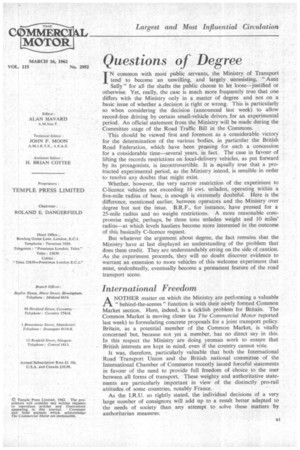Questions of Degree
Page 35

If you've noticed an error in this article please click here to report it so we can fix it.
IN common with most public servants, the Ministry of Transport tend to become an unwilling, and largely unresisting, "Aunt Sally" for all the shafts the public choose to let loose—justified or otherwise. Yet, really, the case is much more frequently true that one differs with the Ministry only in a matter of degree and not on a basic issue of whether a decision is right or wrong. This is particularly so when considering the decision (announced last week) to allow record-free driving by certain small-vehicle drivers for an experimental period. An official statement from the Ministry will be made during the Committee stage of the Road Traffic Bill in the Commons.
This should be viewed first and foremost as a considerable victory for the determination of the various bodies, in particular the British Road Federation, which have been pressing for such a concession for a considerable time—several years, in fact. The case in favour of lifting the records restrictions on local-delivery vehicles, as put forward by its protagonists, is incontrovertible. It is equally true that a protracted experimental period, as the Ministry intend, is sensible in order to resolve any doubts that might exist.
Whether, however, the very narrow restriction of the experiment to C-licence vehicles not exceeding 16 cwt. unladen, operating within a five-mile radius of base, is enough is extremely doubtful. Here is the difference, mentioned earlier, between operators and the Ministry over degree but not the issue. B.R.F., for instance, have pressed for a 25-mile radius and no weight restrictions. A more reasonable compromise might, perhaps, be three tons unladen weight and 10 miles' radius—at which levels hauliers become more interested in the outcome of this basically C-licence request.
• But whatever the argument about degree, the fact remains that the Ministry have at last displayed an understanding of the problem that does them credit. They are understandably erring on the side of caution. As the experiment proceeds, they will no doubt discover evidence to warrant an extension to more vehicles of this welcome experiment that must, undoubtedly, eventually become a permanent feature of the road transport scene.
International Freedom
ANOTHER matter on which the Ministry are performing a valuable "behind-the-scenes" function is with their newly formed Common Market section. _Here, indeed, is a ticklish problem for Britain. The Common Market is moving closer (as The Commercial Motor reported last week) to formulating concrete proposals for a joint transport policy. Britain, as a potential member of the Common Market, is vitally concerned but, because not yet a member, has no direct say in this. In this respect the Ministry are doing yeoman work to ensure that British interests are kept in mind, even if the country cannot vote.
It was, therefore, particularly valuable that both the International Road Transport Union and the British national committee of the International Chamber of Commerce recently issued forceful statements in favour of the need to provide full freedom of choice to the user between all forms of transport. These weighty and authoritative statements are particularly important in view of the distinctly pro-rail attitudes of some countries, notably France.
As the I.R.U. so rightly stated, the individual decisions of a very large number of consignors will add up to a result better adapted to the needs of society than any attempt to solve these matters by authoritarian measures.




















































































































